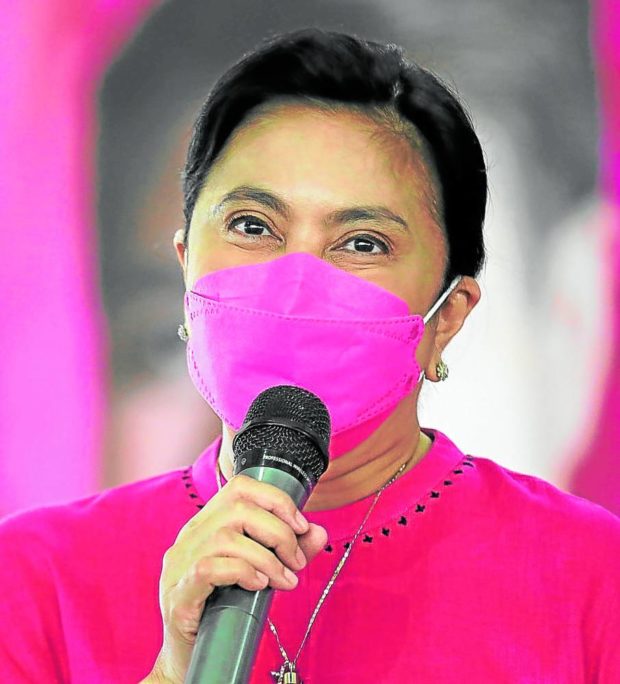
FILE Photo: Vice President Leni Robredo.
MANILA, Philippines — While she is in favor of modernizing the country’s transportation system, especially in Metro Manila, Vice President Leni Robredo insisted that such plans must not lead to an additional burden for commuters and the transport sector itself.
Robredo on Friday explained that the ‘rushed modernization’ of Metro Manila’s transport systems — where public utility vehicles are forced to use common terminals, required to immediately upgrade their jeepney fleets — must be put on hold amid the economic downturn due to the COVID-19 pandemic.
“Gusto po natin ang modernisasyon ng ating public transport. Ngunit ayaw naman po natin bigyan ng karagdagang burden ang ating mga pasahero at drivers. Hindi po natin dapat ipilit ang mga polisiyang hilaw at hindi angkop sa konteksto ng pandemya,” Robredo explained in a statement.
(We want to modernize our public transportation system, but we don’t want it at the expense of more burden for our commuters and drivers. We should not force raw programs and policies that are not well-suited amid the context of the pandemic.)
“Ang pangunahing i-focus po natin ngayon ay maibsan ang kahirapan, ma-revive and ekonomiya at ma-control ang pagkalat ng COVID. Ang mga polisiyang hindi angkop at consistent sa objectives na ito ay dapat isang tabi muna,” she added.
(The primary focus is to alleviate poverty, revive the economy, and control the spread of COVID-19. The policies that do not sit well and are not consistent with these objectives should be set aside for now.)
Robredo further noted that since commuters are finding it difficult to commute using integrated terminals, these areas may be far from where they live, resulting in additional transportation expenses — people are resorting to colorum vans or unregistered vehicles.
This scheme, the Vice President said, is riskier since colorum vans are not monitored by government authorities, who are also checking if public transportation modes are operating with COVID-19 protocols in mind.
“May ilang problema po tayong nakikita kung pipilitin natin ang paggamit ng integrated terminals ngayong pandemya. Dagdag gastos sa mga pasahero ang kailangan pang lumipat ulit ng ibang mode of transport para maghahatid sa kanila papuntang Metro Manila,” Robredo stressed.
(There are some problems that we can see if we would force the use of integrated terminals amid the pandemic. First, this is an additional cost for passengers who would need to shift to different modes of transportation just to arrive in Metro Manila.)
Furthermore, having many people from different areas troop towards a single convergence zone like integrated terminals may also be conducive for COVID-19 transmissions.
“Napipilitan ang mga pasahero na mag colorum van kasi mas convenient ito at mas mura. Ngunit dahil hindi regulated ang mag colorum van na ito, hindi natin ma-garantiya ang safety ng mga pasahero. Hindi rin po safe ngayong pandemic na pag halu-haluin ang mga pasaherong galing halimbawa sa iba’t ibang lugar sa isang terminal bago pumasok sa Metro Manila. Mas lalo itong makakadagdag sa mabilisang pagkalat ng COVID-19,” Robredo explained.
(This also forces passengers to use colorum vans because this is more convenient and less expensive. But because these are not regulated, you cannot guarantee the safety of passengers. It is also unsafe to mix different passengers in one terminal amid the pandemic, like having different commuters who are trying to enter Metro Manila. It only adds to the quick COVID-19 transmissions.)
The current administration’s transport modernization program has continued even amid the COVID-19 pandemic, which led to opposition from some members of the transport sector.
Jeepney drivers, in particular, have been wary that the pandemic will be used to drive their old vehicles away, claiming that the government is claiming that their means of transportation is not fit for the new normal.
READ: Amid pandemic, more questions raised over jeepney modernization
However, a lot of officials have urged the national government to put the brakes on the modernization program, citing the need for more transportation modes with passenger capacities reduced in both public transportation and railway systems to avoid COVID-19 infections.
READ: Escudero asks LTFRB to reconsider phaseout of traditional jeepneys
READ: Poe: Don’t force jeepney modernization program
As for integrated terminals, Robredo — who has experienced commuting from Metro Manila to her hometown Naga City on a regular basis before — said that such methods meant that some people going north or south of Metro Manila would have to pay more just to get to the stations in Parañaque and Bocaue.
“At dahil mas pipiliin ng mga pasahero ang mag colorum, mababawasan din po ang kita ng mga manggagawa sa sektor ng transportasyon. Kaya po habang may pandemya, ang solusyon ay hayaan munang pumasok ang mga provincial buses sa Metro Manila at gamitin ang kani-kanilang terminal. Bawas gastos po ito sa mga pasahero,” she said.
(And because passengers would opt for colorum vans, the earnings of transport sector workers would go down. That’s why amid the pandemic, I think the solution is to allow provincial buses in Metro Manila and use their own terminals. This also shaves expenses on the side of the passenger.)
“Marami pong umaasa ng kabuhayan sa public transport sector. Andyan po ang ating mga drivers, konduktor, mga mekaniko. Napahalaga pong matugunan din natin ang kapakanan nila. Imbis na brasuhin para i-upgrade ang kani-kanilang fleet, bigyan din po sana natin sila ng saklay at alalay. Bahagi po sila ng ating economic frontliners dahil sila ang nagdadala sa ating mga manggagawa sa kanilang trabaho,” she added.
(A lot of people rely on the public transport sector for their livelihood — drivers, conductors, and mechanics. It is important to address their needs and welfare. Instead of forcing them to upgrade their fleet, let us give them aid and assistance. They are part of our economic frontliners because they bring the workers to and from their workplaces.)